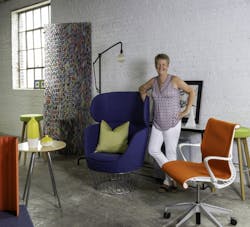Our Designer of the Year Is Changing Lives One Project at a Time
Architect Bill McDonough, celebrated for his pioneering work on the cradle-to-cradle concept and advancing sustainable design, astutely observed that “design is the first signal of human intention.” In other words, it is inherently infused with purpose.
When design is leveraged for the greater good, it has the power to significantly impact the well-being of people and the places they inhabit on this planet for the better.
It is a core belief we uphold here at interiors+sources that guided us in our decision to select this year’s Designer of the Year: Jennifer Sobecki, CEO of Designs for Dignity (D4D). As the head of the Chicago-based nonprofit whose mission is to create restorative environments for other nonprofit service organizations and at-risk populations through pro bono design services and in-kind donations, Sobecki leads with the conviction that design is a transformational force in human life and that every individual should have access to environments that support the wellness of the human spirit.
D4D is celebrating its 20th anniversary this year, and we could think of no better way to join in the celebration than by honoring the vital work Sobecki and her team have undertaken and telling their story.
From Profit to Pro Bono
After graduating with a bachelor’s degree in Interior Design from The University of Dayton, Sobecki concluded that to be successful in the industry, she needed to move to a larger city. In 1997, she relocated to Chicago, drawn by its architecture and design history, culture, and food. She spent her early days working in the showrooms at the Merchandise Mart before launching her own residential practice, which she ran successfully until 2004 when she heard of an organization called Supporting the Spirit, the former name of Designs for Dignity.
“It’s funny; once I heard about [Supporting the Spirit] and met the founder Susie Fredman, I was like, ‘This is my jam. This is what I want to do. I love to give back as an individual and see a real difference at the end of the day,’” she recalls.
Her leap from the for-profit to nonprofit side of the design business was inspired by the organization's mission statement and goal of transforming environments through pro bono design and in-kind donations.
“We’re empowering lives through design,” she says. “It’s all about [the notion that] everyone deserves access to good design because, as we know right now when we’re sheltering in place, our surroundings really matter—especially when you’re stuck in the space.”
Sobecki’s conviction to make a difference in her work stems from the mentorship she received from both her parents and her early encounters with Fredman. She says of her parents: “They instilled in me at a young age to be yourself, always speak with integrity and always treat others as your equal.”
As she’s worked side-by-side with her stellar design and logistics team Jordyn Hunter and Julia Richardson, as well as with D4D’s nonprofit clients, high-end designers, and major manufacturers like Herman Miller and Steelcase, Sobecki says she’s realized the interconnectedness of community in making a difference in the lives of others. “We’re all in this together,” she says, and urges her partners to “figure out how we can have their companies give back and do some greater good with our projects.”
Likewise, she recalls how, early on, Fredman helped her “slow down and realize the why of what we do each and every day, and why design matters.” She reiterates that—now, more than ever—design is crucial because it touches every aspect of life, from where we work to where we live. For Sobecki, there is no better place to put her beliefs into practice than at Designs for Dignity.
How D4D Works
Designs for Dignity harnesses the combined power of pro bono design, construction talent and donated materials to breathe new life into existing nonprofit spaces, giving them the platform from which they can better serve individuals in their focus mission, according to its website. The organization collaboratively designs human-centric spaces rooted in the needs of each organization—and it all starts with a team.
Soliciting the help of interior designers, architects and other industry professionals to donate their time, D4D leverages their talent to create healing environments for its service grant recipients. Manufacturers, vendors, craftsmen, clients, and showrooms provide furnishings and materials that are reused in the spaces, while individuals and community advocates round out the team to implement and carry through the mission for each project.
With a staff of just three people, Sobecki wears many hats from day to day. Whether it’s coordinating fundraising or events with D4D’s board members, managing people or projects, or meeting with designers and project teams to ensure the work continues from ground breaking to ribbon cutting, she describes her role as “a conductor of sorts.”
A central part of her orchestration is the relationships Sobecki and her team have built over time with vendors, who continue to generously donate furniture and goods that fill the spaces they help design. “We’ve been extremely fortunate to receive annual donations of carpet tiles, task chairs, lounge pieces and casegoods from major vendors like AIS, Interface, HON, Shaw, Daltile and KI to name a few, and we’re always leveraging the partnerships for more products to enhance our project spaces.”
The beneficiaries of these generous donations are the nonprofits, of course, who participate in a formal application process for assistance with their projects. From basic design services to branding, Sobecki says D4D will curate the design team to meet the needs of each project according to the timeline, scope and budget.
Designs for Dignity has primarily grown through word of mouth from the work it has done in the city of Chicago and surrounding areas, as well as from building long-term relationships within the community. “We’ve grown a lot in that way, as far as getting new clients and repeat clients,” Sobecki says.
[Related: The Impact of Sensory Design: Well-being Hub from HKS]
Through these vital relationships both with clients and vendors, she says D4D is also able to make a difference in terms of its impact on the environment. Products are recycled and redeployed in a design-driven way, which expands their life cycle and lowers their environmental footprint. “Sustainability is probably equally important to me, to know that we’re giving a second life or a third life to stuff that would normally be thrown in a landfill,” she explains. “That seems just crazy. So, we can leverage the talent in our great city of Chicago to have designers give back and be creative about the resources we have at hand to get redeployed. It’s a win-win for everybody involved.”
Deep Impact
While interior design is certainly about creating beautiful spaces, it can also be much more than that. Sobecki suggests there’s even greater beauty to be found when the power of design is harnessed for the benefit of vulnerable populations and under-served communities.
“You see the impact that you’re having on the end client—the victim of domestic violence or the survivor of sexual assault or the young kid who, he and his family are homeless, and we’re creating this temporary shelter for them, but it feels like home,” she says.
Sobecki describes D4D’s work for these clients as “trauma-informed design,” which recognizes the environment has a profound impact on our physical and emotional well-being. “We’ve always been implementing this practice, but we didn’t know what to call it.” Essentially, she defines it as: “designing in a way that helps the client feel safe and secure and trusted is paramount to what we do.”
D4D strives to design a better space for every client regardless of what their mission or budget is, and to stretch every dollar as far as it can go. “We’re advocating on behalf of the organization to leverage whatever budget they have to the hilt, so that we’re creating these environments that can lift people up and nurture their human spirit and get them back on the road to recovery, or stabilized to secure employment or settled into their own space to become their best selves,” Sobecki explains.
The best part is that the work D4D is doing has a ripple effect as people transition in and out of many of these facilities. “It keeps repeating because the next set of clients that are walking through that door feel like they have a place to call home or they feel like, ‘I’m walking through a space that has welcoming light and vaulted ceilings, and it feels like I can let my guard down and know that I can tell my story and make my way to recovery and feel trusted and that I am worthy.’”
When you add it all up, Designs for Dignity has made a tremendous impact on its clients and the communities they serve over the past 20 years. To date, D4D has:
- Completed more than 250 projects representing 1.5 million square feet of space
- Leveraged more than 26,000 hours of generous pro bono design services from local practitioners
- Received upwards of $17 million worth of furniture and materials from its manufacturing partners
- Impacted nearly 800,000 people through the projects D4D has been involved in—and there’s no dollar amount you can place on that
“We’re proud of the impact that we’ve had, and we’re looking forward to working with our project partners, new and old, to manage things through these times,” Sobecki says. She adds that Designs for Dignity wants to do more—to be involved in more projects, more donations and more cities.
“We want to be the go-to resource for the nonprofit community when it comes to pro bono design,” she explains. “Let’s use the expertise and let’s leverage these amazing volunteers that do want to give back in our community and go from there. We’re here to meet the growing need and move beyond and continue to empower lives through design.”
Supporting the Cause: $20 for 20 Challenge
To celebrate its 20th anniversary, Designs for Dignity has launched a campaign through the end of the year to raise funds in support of its mission to empower lives through design. It is asking for the support of the design community by making a one-time or recurring monthly donation of $20 (or more) to D4D.
For those who are unable to give financially, encourage 20 close friends to donate $20 or get the word out through your social media channels. Every action counts and will help impact the lives of those in greatest need.
For more information or to make a donation, visit https://www.designs4dignity.org/pro-bono-design-for-nonprofits/20-for-20/
Read Next: Here’s Why the Design Industry Lacks Diversity and How it Will Change
About the Author
Robert Nieminen
Market Content Director
Market Content Director, Architectural Products, BUILDINGS, and interiors+sources
Robert Nieminen is the Market Content Director of three leading B2B publications serving the commercial architecture and design industries: Architectural Products, BUILDINGS, and interiors+sources. With a career rooted in editorial excellence and a passion for storytelling, Robert oversees a diverse content portfolio that spans award-winning feature articles, strategic podcast programming, and digital media initiatives aimed at empowering design professionals, facility managers, and commercial building stakeholders.
He is the host of the I Hear Design podcast and curates the Smart Buildings Technology Report, bringing thought leadership to the forefront of innovation in built environments. Robert leads editorial and creative direction for multiple industry award programs—including the Elev8 Design Awards and Product Innovation Awards—and is a recognized voice in sustainability, smart technology integration, and forward-thinking design.
Known for his sharp editorial vision and data-informed strategies, Robert focuses on audience growth, engagement, and content monetization, leveraging AI tools and SEO-driven insights to future-proof B2B publishing.

